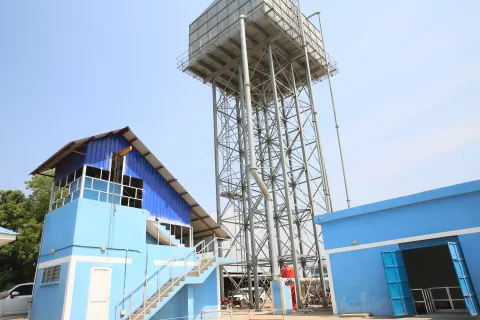Flushing out disease with a new market latrine
On the outskirts of Juba, at the biggest wholesale fruit and vegetable market in the country, a new latrine is changing hygiene practices and setting an example for South Sudan

Just past Juba bridge that spans the River Nile, market vendors straighten piles of produce as dozens of trucks roll in – most from Uganda. This is the last port of call for thousands of kilos of fresh food before it is bought at wholesale and sold in markets across the country.
A latrine unit built one year ago by UNICEF and partner Malteser International in this transit epicenter has sparked new, positive hygienic behavior changes and a decrease in illnesses - the most common being typhoid, malaria, and gastro infections. An average of 5,000 people passes through the market of 1,000 traders per day, while a permanent community of 2,000 reside nearby.
In a country not used to formal toilets, 63 percent of the population practice open defecation, while in this community six out of 10 households still have no in-home latrine, increasing the importance of a clean, safe public facility.

In front of a well-presented concrete building painted a shade of soft yellow, latrine manager Michael Dau sits under an oversized rainbow umbrella, poised for any user who may come his way. Separated by gender, two toilets and one shower unit can be found at the top of a short ramp to the left and right respectively.
“I have worked here for seven months. The number of people using the latrines are increasing. The first day I opened the latrines there were only six people the whole day. Today, the average is 150.”


Why the increase? Because it is kept clean and is safe. Toilet paper, water and soap are all provided for the low cost of 50 SSP (approximately 0.20 cents USD) per use. “After people come here, they go back and tell others. It spreads by word of mouth.”
As the popularity for the latrine has grown, so have behaviors adapted.
“It has changed the community in our day to day lives. People used to go in the bush. When they did this during the rainy season it could bring in cholera and a lot of diseases,” said community resident Molley Akelo. “Practicing good hygiene is the most important thing a person can do. You can wear nice clothes, look good, but most important is being clean.”
While latrines address health and sanitation, they also help to restore dignity.
“The latrine has improved privacy, especially for women. It is covered, it is clean, it is secure,” said market manager Twaha Uthuman. “Women get monthly problems. When they must go and change a pad, but have no privacy to do so, you see women uncomfortable and susceptible to infection. Urinary tract infections have decreased and there has been positive feedback.”
UNICEF South Sudan and its partners recognized that women in South Sudan are frequent targets of gender-based violence when using latrine facilities after sunset. “It is common to have incidents in other, badly lit latrines,” admits Akelo. Here, solar panels have been installed and good lighting is guaranteed from the opening time 6.30am until the doors are locked at 10pm – making coming and going safer, as well as the use of the facilities. There have been no incidents to date.
In 2019, UNICEF and its partners facilitated basic sanitation facilities for more than 189,000 vulnerable people nationwide, with a focus on gender sensitive latrines a priority to mitigate the risk of gender-based violence.

Latrine Manager Dau moved to South Sudan from Uganda to look for work, like many in the community. His striving for economic resources now incorporates educating others on the importance of sanitation.
“We needed a change in our market,” explains Dau, who has lived here for one and a half years.
“I talk to the latrine users about washing their hands before going back to the market and handling food, less people are getting sick now.”
“Here, everything goes together – food and toilets,” states Uthuman, who uses a megaphone to frequently share UNICEF-guided sanitation messaging and promote Ebola prevention.
Every Saturday is mandatory ‘sanitary day’ in the market, when no one is allowed to open their business until 10am. Nothing is offloaded from trucks and nothing is sold. The morning hours are used to clean and disinfect everything. “Only after we approve of their cleaning can they start trading.”
In the past five years there has been small but steady growth of traders and residents alike. Uthuman hopes that in five years, should no insecurity issues arise, the market will accommodate 10,000 – double the current numbers.
While currently all of the latrine profits go back into the operation costs, in the future they will also contribute to further job creation as users increase.
“In the near future we may request for another to be built, as it will not be enough for the population,” admits Uthuman. “We know that a latrine is important to the community. We are very proud of this latrine.”
UNICEF is working with the German Development Bank (KFW) to build more latrines such as this across South Sudan, in areas that need them most as demand and popularity grows – ultimately changing sanitation behaviors and improving health for thousands.




